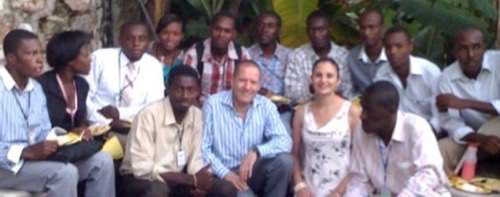University of the People, the tuition-free online academic institution, has started its first courses in Haiti this week. UoPeople’s methods of hooking up students to top-quality courses, underwritten by respected academics, in coherent paths of study has attracted a lot of attention in the earthquake-damage country. 250 students are in the UoPeople’s first class, including this 21-year-old.

“Since the earthquake, I have been sleeping in the street, under a tent, and nobody cares about my education anymore. University of the People is better than food and a tent. And education is even better than a visa or a green card.”
The UoPeople’s methods marry peer-based in-person courses with online curriculum, overseen by a board of high-profile academics in partnership with Yale, the Clinton Global Initiative and others. Although it has yet to achieve accreditation, it is not a “self-improvement” course, but rather offers real undergraduate degrees: Associate and Bachelor degrees in both Computer Science and in Business Administration. Over 700 students in 100 countries attend.

The nearly two-year-old organization is part of a trend that has seen almost six million people in the U.S. alone enrolled in distance learning courses, according to a recent study by The Sloan Consortium. The improvement in technology from instant messaging to video sharing has made it a much more viable concern.
An interesting aspect of the University of the People program is the library.
“Students and faculty have access to subscriptions via Library and Information Resources Network (LIRN), a rich and powerful collection of over 60 million proprietary resources. Additionally, the center provides recommendations of open educational resources, including open access textbooks and course materials. The Library Services offered by the ULRC also includes online access to assistance from librarians.”
The UoPeople was founded by Shai Reshef. Reshef is an entrepreneur (both for-profit and social), an Ashoka Fellow and was named an “Ultimate Game Changer” in Education by the Huffington Post. Like most entrepreneurs, he saw an opportunity.

“In my 20 years working in the education arena, coupled with extensive world travel, I noticed there was one issue that unites countries, cities and states around the globe–the need for improved and accessible education. I had previously run several online educational companies and realized the tools to make this possible were readily available–dropping technology costs, the Internet, computers and open education resources–they just needed to be utilized in a new way.”
For those who worry that “you get what you pay for,” this education isn’t 100% “free.” There is an application fee and end-of-term exam fees. But students without computers and Internet access can use the Student Computer Center in Port-au-Prince. The Center provides access to computers, satellite internet connection, furniture and support staff.

















